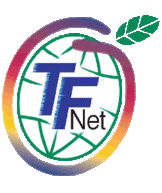International Tropical Fruits Network facts for kids
The International Tropical Fruits Network (TFNet) is a global group. It helps countries grow, sell, and enjoy tropical fruits. It was started with help from the Food and Agriculture Organization of the United Nations (FAO). TFNet is now an international organization. This means governments and other groups work together. Their main goal is to make sure tropical fruits are grown and used in a way that is good for the planet and people. This includes how fruits are grown, eaten, and traded around the world. TFNet has members from many countries. Each country works through one main agency.
TFNet has hundreds of members from 38 countries. Fourteen of these are governments. Some of these countries are Australia, China, India, Malaysia, Nigeria, and the Philippines. TFNet also has many other members. These include companies and organizations like CAB International and Bioversity International.
Contents
Why TFNet Started
In 1996, a big meeting about tropical fruits happened in Malaysia. People from 22 countries came together. They talked about how tropical fruits were bought and sold. They also discussed future plans for fresh and processed fruits. Important topics like taxes and rules for keeping plants healthy were also discussed.
Everyone at the meeting agreed on one thing. Tropical fruits are super important for our health! They give us vitamins, nutrients, and fiber. To help with these issues, they suggested creating a special network for tropical fruits.
Later, a group called the Sub-Group on Tropical Fruits (SGTF) was formed. In 1998, this group decided that TFNet should be a global network. It would work on its own. Both Malaysia and Thailand wanted to be the home for TFNet's main office. In 1999, it was decided that Malaysia would host the headquarters.
What TFNet Does
TFNet works on many projects and activities. They help countries improve how they grow and sell tropical fruits.
Projects and Studies
TFNet often works with other international groups. For example, they teamed up with the FAO. Together, they made plans to help countries like Bangladesh, Fiji, Malaysia, and the Philippines. These plans focused on growing tropical fruits in a lasting way.
TFNet also worked with GIZ (a German organization). They studied how to protect new fruit types in eight Asian countries. They also helped with a project about saving tropical fruit plants in Asia. This project was with Bioversity International and the Asian Development Bank.
TFNet has also done local projects in Malaysia. These projects focused on fruits like pineapple and watermelon.
International Meetings
TFNet organizes big international meetings. These meetings are about tropical and subtropical fruits. People discuss how to trade fruits, how to handle them after harvest, and how to process them. They also talk about what customers like and how to export fruits. Recent developments in growing and selling fruits are also shared. These meetings have happened in many countries in Asia and Africa.
Workshops and Study Trips
TFNet also holds hands-on workshops. They organize study trips too. For example, they taught people how to make fruit chips. This was done with a group in Indonesia. TFNet also helped Syria for three years. They taught them how to handle and process fruits after they are picked. This help was funded by the Malaysian government. Workshops and study trips have taken place in Malaysia, Indonesia, Thailand, Fiji, Nigeria, and other countries.
Sharing Information
TFNet helps members share important information. They have a website and an information portal. This portal includes a list of fruits, experts, and trade information. It also has discussion forums. TFNet sends out a monthly news update about tropical fruits around the world. They also helped create MyFruit.org. This is a global information system for African tropical fruits.
Who Can Join TFNet
TFNet has different types of members.
Country Members
Any country that is a member of the FAO can join TFNet. They just need to agree to the rules.
Current country members include:
- Malaysia
- The Republic of Fiji
- The People's Republic of China
- The Syrian Arab Republic
- Federal Republic of Nigeria
- Republic of Indonesia
- People's Republic of Bangladesh
- Republic of the Philippines
- Republic of India
- Republic of Sudan
- The Socialist Republic of Vietnam
- The Commonwealth of Australia
- Republic of Sri Lanka
- Kingdom of Saudi Arabia
Associate Members
Any international or national organization can become an associate member. This includes companies, institutes, and associations.
Some well-known associate members are:
- CAB International
- Bioversity International
- Sime Darby Plantation Bhd.
- Global Food Traceability Forum (GFTF)
- Afro-Asian Rural Development Organization (AARDO)
- International Centre of Insect Physiology and Ecology (ICIPE)
Ordinary Members
Any person or non-profit group can become an ordinary member. They just need to help TFNet reach its goals.
Official Website
Official Website: http://www.itfnet.org/v1/
 | Delilah Pierce |
 | Gordon Parks |
 | Augusta Savage |
 | Charles Ethan Porter |


